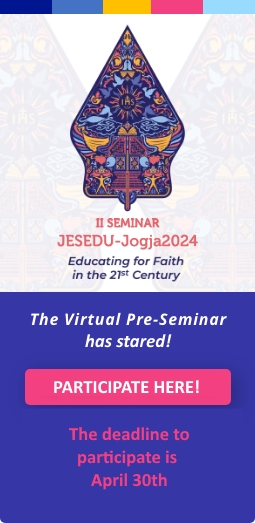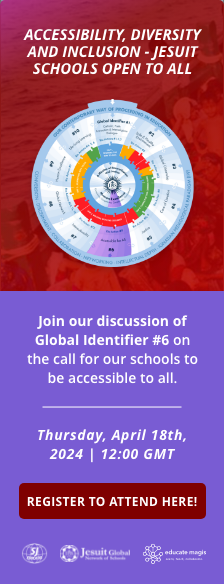Although obviously the remote learning framework was a reactionary build and looks different from our “at school” model, I have feelings of consolation as we continue with a new rhythm and momentum today. We problem solve and literally forge a new path in education. Remote learning allows us to reimagine school and in doing so approach conversations, decisions, actions, and relationships through a distinctly reflective Ignatian lens and way of proceeding we call the magis.
For me, Magis means living in an ongoing process of continuous quality improvement – building . . . working to be in better friendship with Jesus on the path toward knowing we are loved unconditionally by God – always being a reflective practitioner, being flexible and fluid, to be better. Bart Geger, SJ, suggests, the magis is “the more universal good.” And Andy Otto, Ignatian blogger and spiritual director, weighs in on defining magis, when he writes:
Magis is this desire to do more for Christ, more for the glory of God, more to grow into ourselves. The future for many of us can be daunting and frightening. It’s unknown and uncertain. But when you look at your future in the spirit of magis it becomes exciting. Magis carries with it the spirit of restless desire for greater things, a deeper attentiveness, a deeper spiritual life, and more meaningful relations. Sure, my future may be uncertain, but knowing that I have the chance to shape it in relation to my desires for greater things brings God into the picture.
- Rather quickly, we created a framework for remote learning based upon research and dependent upon already-existing technological infrastructures that we are blessed to have in place at school. We have the tools and the staff who help frame and guide our work. We have students and parents, committed to Jesuit education. We are implementing our new framework and adjusting its components and expectations based upon experiences and thoughtful conversations, when needed. Here are some concrete components of our remote learning framework:
- Schedule: a schedule that is predictable and supportive exists for students, with expectations that students are engaged in their own learning.
- Class Time: creating classes that are synchronous and asynchronous based upon a digital educational platform we already use.
- Support for All: continuing support for students with learning plans and those who are economically & resource disadvantaged.
- Simplification: working to simplify and reduce class work, homework, and expectations for students. We all care deeply about education; always, though, we keep in mind stress levels and psychological well-being of students, families, and our teachers.
- Assessment: how we end looks a little different. We replace high-stakes exams with exit projects, where students summarize and synthesize their experiences.
- Conversations: our principal proposed introducing student conversations at the end of our year, using a common template with prompts based upon The Profile of the Graduate and Graduation. These conversations help students process their experiences – prior to and during remote learning – and help students imagine a future that is hopeful and practical, setting goals for the next academic year.
- At the forefront of our thinking about this remote learning framework is our priority on students experiencing this pandemic. How do we accompany our students, challenge them to reflect, and support our families? How do we accompany one another, realizing that while content and skills are important, the social and emotional well-being of our students, their families, and our faculty and staff are more important?
- We continue to provide opportunities to create community and celebrate in gratitude for what we are and what we have. Below are small ways we do this:
- Department check-ins (2-3 Xs a week) with time for everyone to share out, get advice, and listen to one another. These check-ins allow us to track progress, communicate, and consider changes to our flexible remote learning framework.
- Leadership check-ins daily, to assess the framework and make, communicate, and implement changes (when needed).
- Checking in with each De Smet Jesuit family, via a phone call, to let our families know we are thinking about them and to give them time to ask questions and provide support.
- Social media student recognition: senior college acceptance media blitz, junior ring day delivery, student achievement honors and awards recognition, etc.
- Recognition and appreciation of faculty and staff.
- Staff & faculty virtual get-togethers.
- Staff & faculty online Ignatian Evenings – focused on spirituality and prayer.
- Staff & faculty online Examen, allowing us to review our experiences – where did we find God and where did we miss God?
- Staff & faculty continuing opportunities for online PD.
- Staff & faculty opportunities for self-guided, at-home retreats, in the coming summer.
- How do we continue to consider and help those affected by this pandemic and offer support we can – locally and regionally, working with local and regional hospitals and first-responders to share resources? How do we thoughtfully and wisely invest in and network with local businesses?
- And how is this part of God’s plan?
During productive and supportive Microsoft Team Meetings, Zoom Meetings, email exchanges, and brainstorming sessions, I have often found myself returning to The First Principle and Foundation, as a centering reflection almost daily. In particular, I use as a guide, “For everything has the potential of calling forth in us a deeper response to our life in God.” Everything. As we consider continuous quality improvement into an unknown future, here are some reflections for remote learning that will guide us toward continuous quality improvement.
Teaching & Instruction
- How do we use teacher self-reflection and surveys as tools toward continuous evaluation and improvement of student instruction during remote learning experiences? In addition to continuing to maintain a teacher growth and renewal program based upon goals teachers set for themselves and reflection on class visits and conversations, we ask teachers to reflect on their remote learning strategies – by providing some remote learning prompts for consideration around class, innovative education, students, curriculum, and faith formation. In addition to offering reflective prompts, we also survey students, parents, and faculty. We analyze survey results trends, and we make instruction suggestions to teaching faculty for remote learning in the future.
- How do we re-imagine what the end of an academic year looks like? Our end includes replacing high-stakes final exams with smaller, more manageable projects. What roles do teacher collaboration and creativity play? We finish the year with meaningful conversations with all students – in groups – around the tenants of The Profile of the Graduate at Graduation, encouraging students to be reflective and set goals. We use a common framework for those meaningful end-of-year conversations.
- What does learning look like next year? What is the likelihood that will improve our existing remote learning framework to include some type of hybrid-learning framework for next year, where students are both attending school and learning remoting? Perhaps one in which the student body is not all together, but rather attending school by class or by academic subject? How can we continuously revisit our existing remote learning framework – to be better?
Curriculum
- How can we imagine a remote learning curriculum that consolidates existing resources? How can we work smarter and more efficiently and effectively? How can remote learning push us to provide more common experiences for multi-section courses? How can remote learning help teams of colleagues work more collaboratively on common assessments and class synchronous and asynchronous learning experiences for students?
- How can remote learning encourage us toward meaningful cross curriculum work by helping organize courses around themes that are relevant to current events and consistent with mission-driven initiatives? We have developed a meaningful cross-curriculum and mission-driven piece that focuses on essential questions on a common theme for each academic discipline, as well as ideas about how we can use the Jesuit Universal Apostolic Preferences to frame our experiences.
- How can we think about continuing to be creative, innovative, and network? During a time when most of us are focusing on sustaining what we have, we are excited to think about building for the future. This spring, De Smet Jesuit High School is set to launch a classroom initiative with an all- girls Catholic high school on the east coast, to create a collaborative classroom through Arrupe Virtual Learning Institute’s (AVLI) Bridges Program. This class is being created and taught by Bridget Bowers, English teacher at our school. The class will focus on gender studies and dialogue between genders, through lenses of literature and psychology. The class will bring students together from our all boys Jesuit Catholic school in St. Louis and the all-girls Catholic school out east. Bowers will work in collaboration with a few student leaders from De Smet Jesuit and a few student leaders from the all-girls Catholic school, to create the class. Once created, the course will move through approval and launch. The course – which will be taught from our campus but on both campuses – will have online synchronous and asynchronous components. We are excited to be in partnership with AVLI for this course creation and launch. We hope the course will affirm our commitment to network outside our building and learn about the experiences of others, set in a Catholic context. We are also excited at the prospect that our students will be interested in this elective course as part of our Global Education Certificate program. The course is being collaboratively created in the 2020-2021 academic year, and will launch in the fall of 2021. Track our progress at AVLI Bridges.
PD & Faith Formation
- What does PD look like today? We continue to encourage our faculty to grow professionally through development opportunities online, during this pandemic. Many return from these experiences having a better sense for remote learning and what students experience. Therefore, not only the content, but also the skills, help teachers be better.
- We provide online adult faith formation. Our Ignatian Evenings have moved online, thanks to Zoom. We are ending the year with an institutional Examen, thanks to Zoom. And we are investing in faith and spiritual resources so teachers can even make four self-led retreats based upon the Spiritual Exercises – from their homes, this summer. Here is our Adult Faith Formation description of those offerings. Magis – continuous quality improvement toward a deeper relationship with God – can truly be enjoying being in the tension of survival, sustainability, and maintenance, while at the same time being creative, expansive, and generative –toward building and creating for our future!

